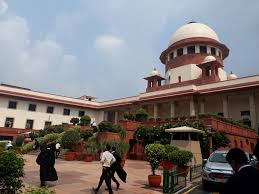The period of lease was for 33 years. The suit premises was sublet without permission by respondent no(s). 1 and 2. (Para 4)
After the expiry of the lease by efflux of time, the appellant issued a legal notice requiring respondent no. 2 to hand over the vacant possession. A reply was given stating that the possession having been handed over only on 25.11.1966, the lease subsists till 24.11.1999. On receipt of the said reply-notice by respondent no. 2 dated 05.06.1999, a second notice was issued by the appellant to which a different response came; that the said registered lease was extended orally for another 33 years. A reference was also made to the arbitration clause available under the original lease deed. (Para 5)
It was dismissed inter alia holding that there is no legal basis to continue in occupation after the expiry of the lease. (Para 7)
The dilatory tactics adopted by respondent no(s). 1 and 2 continued even thereafter, to the extent that the appellant had to file an execution petition in E.P. No. 29 of 2014 on 18.10.2014. Even during the execution proceedings, respondent no. 2 did not raise the plea of maintainability of the suit. However, after four years during which time also the Court was successfully prevented through a series of applications/objections, obviously at the instance of the respondents, an additional counter was filed raising the plea that the suit as laid and decreed ought not to have been entertained in view of the dictum rendered by this Court in Faseela M. v. Munnerul Islam Madrasa Committee and Another, (2014) 16 SCC 38 which in turn relied upon the decision rendered in Ramesh Gobindram (Dead) through LRs. v. Sugra Humayun Mirza Wakf, (2010) 8 SCC 726. The objection raised was not found to be tenable by the Executing Court by dismissing the application filed under Section 47 of the Code of Civil Procedure, 1908 (hereinafter referred to as “the Code”). On a revision, the High Court of Telangana reversed the decision of the Executing Court by placing reliance upon the decision of this Court in Ramesh Gobindram (Supra). The said order passed is under challenge in this appeal. (Para 8)
The onus lies heavily on the judgment-debtor to convince the Court that a decree is inexecutable. When an exercise is likely to involve a factual adjudication, it should better be avoided. (Para 14)
Having dealt with the aforesaid principle and making it applicable to the Courts in India, we are inclined to hold that any failure on the part of the Court to do so would draw the legal maxim “actus curiae neminem gravabit’ (no one shall be prejudiced by an act of Court). As a consequence, in a case where a Court has failed to check its jurisdiction and a plea has been raised subsequently and that too after receiving an adverse verdict, the forum shall not be declared as the one having lack of jurisdiction, especially when there is no apparent injury otherwise to the rights conferred under a particular statute. (Para 25)
Therefore, we have no hesitation in setting aside the order impugned passed by the High Court in C.R.P. No. 1264 of 2021 dated 23.11.2021, by restoring the one passed by the Executing Court, i.e. the Court of the III-Additional Chief Judge, City Civil Court at Hyderabad in E.P. No. 29 of 2014 dated 10.08.2021. (Para 32)
SUPREME COURT OF INDIA
2023 STPL(Web) 374 SC
[2023 INSC 949]
Mumtaz Yarud Dowla Wakf Vs. M/S Badam Balakrishna Hotel Pvt. Ltd. & Ors.
Civil appeal no. 6933 of 2023 [Arising out of SLP (C) No. 997 of 2022]-Decided on 20-10-2023
https://stpllaw.in/wp-content/uploads/2023/10/2023-STPLWeb-374-SC.pdf







